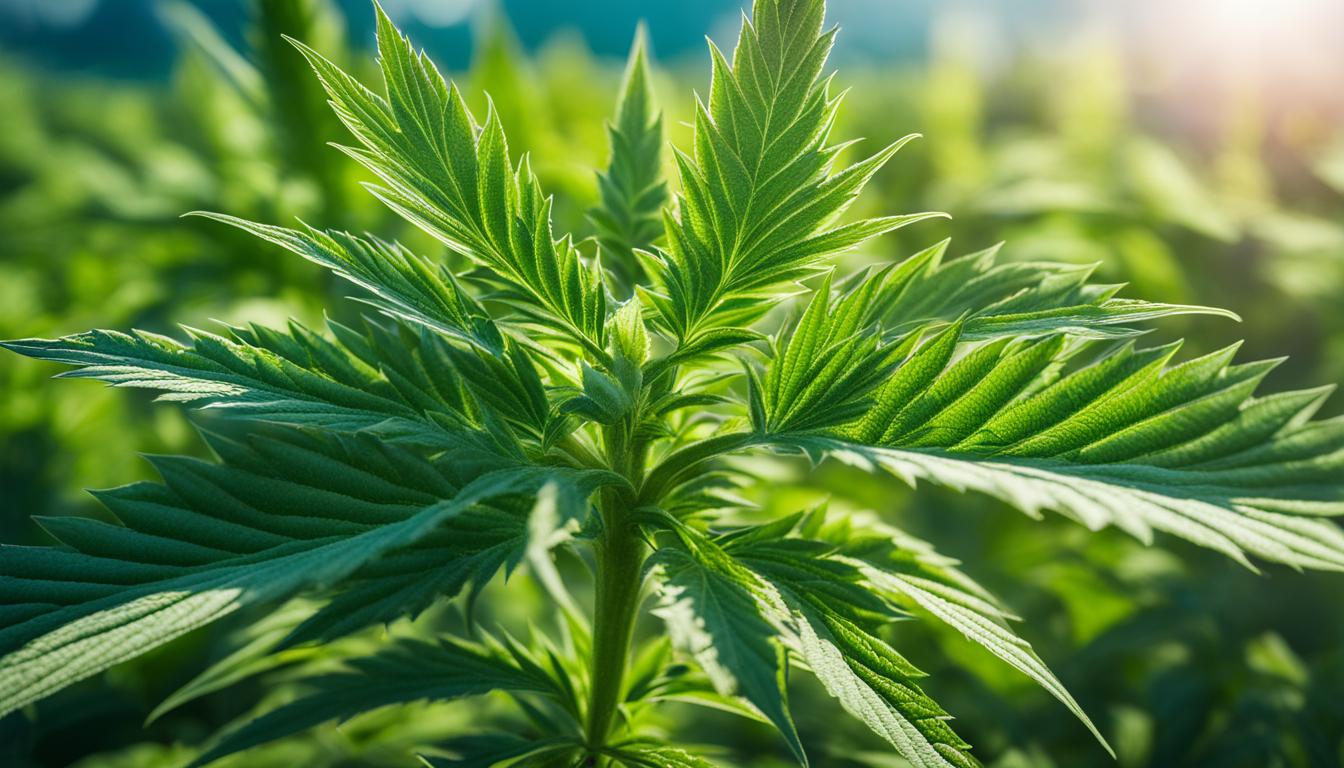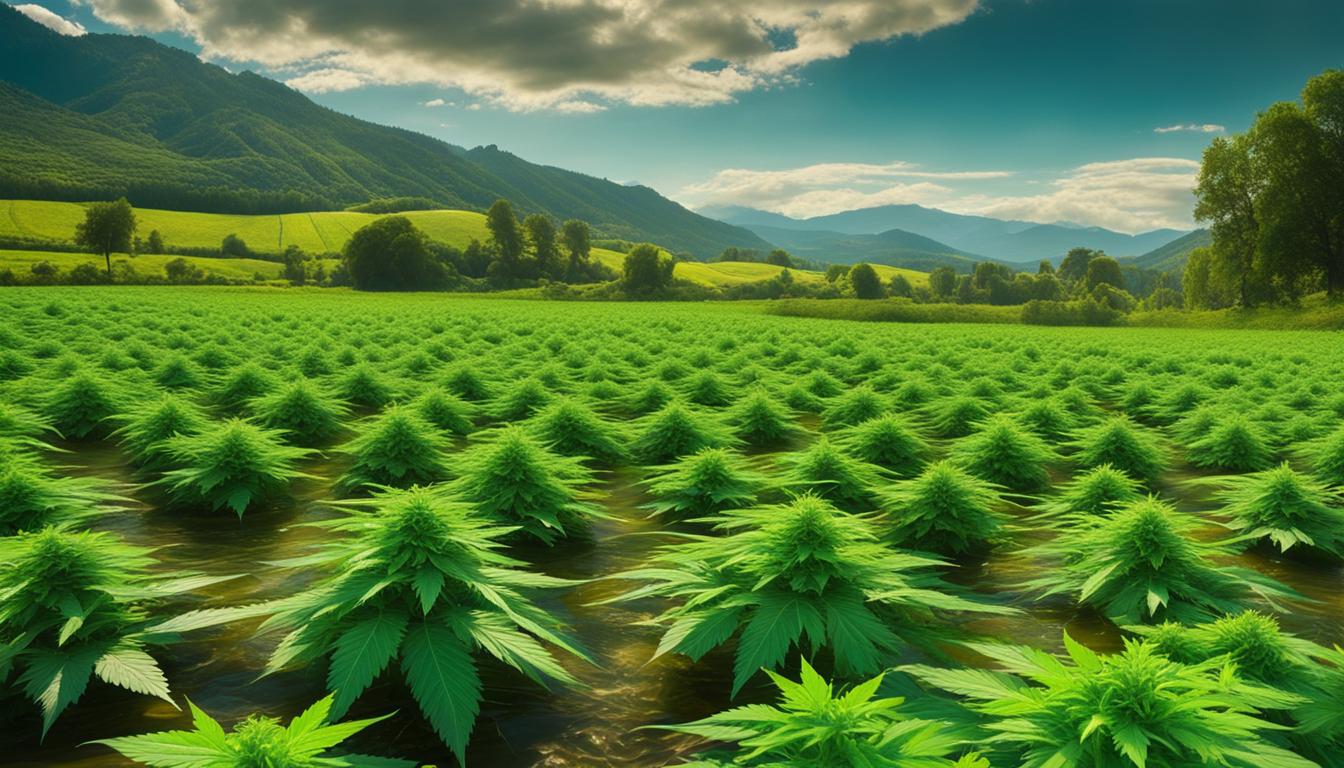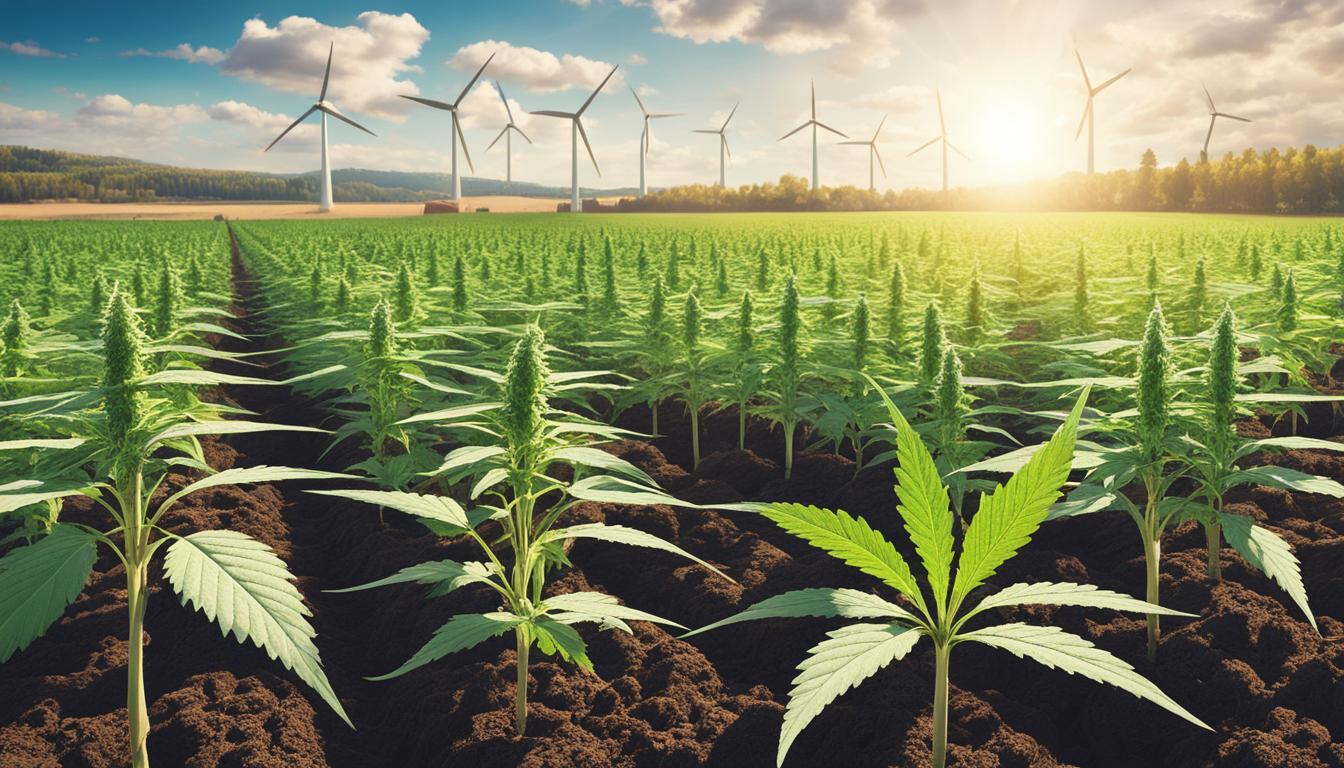Uncategorized
Naturally Farmed Cannabis: Pure & Sustainable
When it comes to cannabis cultivation, a growing number of consumers are seeking a more natural and sustainable approach. Enter naturally farmed cannabis, which is gaining popularity for its commitment to organic farming practices and environmental sustainability. With a focus on purity and ecological consciousness, this innovative form of cannabis farming prioritizes the use of natural cultivation methods and eliminates the need for synthetic pesticides and chemical fertilizers.
By embracing naturally farmed cannabis, growers aim to produce high-quality cannabis seeds while minimizing the environmental impact. This emphasis on sustainability extends beyond the cultivation process to include factors such as water conservation and biodiversity preservation. With a commitment to eco-friendly practices, naturally farmed cannabis flower offers a greener alternative to conventional cultivation methods.
Key Takeaways:
- Naturally farmed cannabis is grown using organic cultivation methods and promotes sustainability.
- It avoids synthetic pesticides and utilizes eco-friendly practices to minimize environmental impact.
- Natural cultivation methods help preserve soil health and biodiversity.
- Sustainable cannabis cultivation techniques focus on minimizing waste and energy usage.
- Pesticide-free cannabis ensures product purity and consumer safety.
Now that we’ve explored the concept of naturally farmed cannabis and its commitment to purity and sustainability, let’s delve into the numerous benefits it offers for both consumers and the environment.
Benefits of Naturally Farmed Cannabis
Naturally farmed cannabis offers numerous benefits that stem from its natural cultivation methods and environmentally-conscious farming practices. By prioritizing organic and sustainable approaches, this type of cannabis farming promotes soil health, biodiversity, and resource conservation. Let’s explore some of the key benefits:
Preservation of Soil Health
Natural cultivation methods, such as composting and cover cropping, play a vital role in preserving soil health. Composting enriches the soil with organic matter, improving its structure and nutrient content. Cover crops help prevent erosion, suppress weeds, and enhance soil fertility. By utilizing these practices, naturally farmed cannabis maintains fertile, productive soil for future cultivation.
Biodiversity Conservation
Environmentally-conscious cannabis farming emphasizes the importance of biodiversity preservation. By avoiding the use of synthetic pesticides and chemical fertilizers, naturally farmed cannabis creates a more hospitable environment for beneficial organisms. This includes insects, birds, and microbes that contribute to the overall ecosystem balance. The preservation of biodiversity supports the long-term sustainability of cannabis cultivation and promotes a healthy and thriving ecosystem.
Reduced Water Usage
One of the significant benefits of naturally farmed cannabis is the reduced water usage. Water is a precious resource, and sustainable farming practices aim to minimize its consumption. Through methods like drip irrigation and water-recirculation systems, growers can optimize water usage and minimize wastage. By practicing water-efficient cultivation, naturally farmed cannabis addresses water scarcity concerns and promotes responsible water management.
Minimized Chemical Releases
Naturally farmed cannabis avoids the use of harmful chemicals, pesticides, and synthetic fertilizers, resulting in minimized chemical releases into the environment. By employing natural pest control methods, such as beneficial insects or integrated pest management, growers can effectively manage pests without resorting to harmful substances. This approach contributes to a healthier ecosystem, reduces pollution, and promotes the overall well-being of the planet.
By encompassing these environmentally-conscious practices, naturally farmed cannabis showcases its commitment to sustainability, soil fertility, biodiversity conservation, and responsible resource management. These benefits align with the increasing consumer demand for organic and sustainable products, making naturally farmed cannabis an attractive choice for conscious consumers.
Stay tuned for the upcoming sections to dive deeper into the sustainable cultivation techniques, pesticide-free practices, and the role of regenerative agriculture in cannabis farming.
Sustainable Cannabis Cultivation Techniques
Sustainable cannabis cultivation techniques are essential in promoting eco-friendly production and minimizing the environmental footprint of the industry. By implementing earth-friendly growing techniques, cannabis farmers can prioritize sustainability while maintaining high-quality crops.
One important aspect of sustainable cultivation is the use of renewable energy sources. By powering grow lights with solar or wind energy, growers can significantly reduce their reliance on non-renewable resources and lower carbon emissions. This not only benefits the environment but also reduces operational costs in the long run.
Another key technique is water recirculation, which helps minimize water consumption in cannabis cultivation. By implementing recirculation systems, growers can collect and filter excess water runoff, allowing it to be reused for future irrigation. This reduces the strain on local water sources and promotes responsible water management.
Moreover, eco-friendly cannabis production involves the use of organic pest control methods to manage pests without relying on harmful pesticides. One effective approach is the introduction of predatory insects that naturally prey on common cannabis pests. This eliminates the need for chemical interventions, ensuring a safer and more sustainable growing environment.
“Sustainable cannabis cultivation techniques prioritize the use of renewable energy, water recirculation, and organic pest control methods.”
These sustainable techniques not only promote eco-friendly practices but also contribute to the overall quality and purity of the final product. Consumers are increasingly conscious of the environmental impact of their purchases and are seeking cannabis products that align with their values.
Sustainable Cannabis Cultivation Techniques Table:
| Technique | Description |
|---|---|
| Renewable Energy | Powering grow lights with solar or wind energy to reduce reliance on non-renewable resources. |
| Water Recirculation | Implementing systems to collect and filter excess water runoff for reuse, minimizing water consumption. |
| Organic Pest Control | Using predatory insects and other natural methods to manage pests without harmful pesticides. |
Pesticide-Free Cannabis
Naturally farmed cannabis offers a safer and cleaner alternative to conventionally-grown cannabis. One of the key advantages of this method is that it prioritizes the production of pesticide-free cannabis, ensuring that consumers can enjoy a natural and untainted product.

Pesticides are chemical substances used in conventional farming to control pests and diseases. However, they can leave residues on the final product, posing risks to human health when consumed. By avoiding the use of pesticides in the cultivation process, naturally farmed cannabis eliminates the potential for chemical contamination in marijuana.
Choosing pesticide-free cannabis means opting for a product that is free from harmful chemical residues and provides a cleaner and purer consumption experience. It also aligns with the growing demand for organic and naturally cultivated products among consumers who prioritize their well-being and the quality of what they consume.
Naturally farmed cannabis achieves its pesticide-free status through the implementation of organic pest management techniques. These techniques often include the use of natural predators, such as beneficial insects, to control pests in a sustainable and chemical-free manner.
In addition to promoting consumer safety, the embrace of pesticide-free cannabis reflects a commitment to sustainable and environmentally-friendly farming practices. By reducing reliance on synthetic chemicals, naturally farmed cannabis contributes to the preservation of biodiversity and the health of ecosystems.
When considering cannabis consumption, opting for pesticide-free products offers peace of mind and reassurance that the marijuana is produced naturally without compromising consumer health or the environment.
Environmental Benefits of Naturally Farmed Cannabis
Naturally farmed cannabis offers several environmental benefits. By embracing green cannabis cultivation and environmentally-conscious cannabis farming practices, growers contribute to the preservation of our planet and the well-being of our ecosystems. Here are some of the key advantages of naturally farmed cannabis:
Reduction in Water Pollution and Soil Degradation
One of the significant environmental benefits of naturally farmed cannabis is the avoidance of synthetic fertilizers and pesticides. These harmful chemicals, when used in conventional cultivation methods, can contaminate water sources, leading to water pollution. By eliminating their usage, natural cannabis farming helps protect water bodies and aquatic ecosystems. Furthermore, the absence of chemical fertilizers and pesticides minimizes soil degradation, preserving the long-term fertility and health of the soil.
Conservation of Natural Resources
Sustainable cultivation techniques employed in naturally farmed cannabis also contribute to resource conservation. Water, a precious resource, is utilized more responsibly through practices like water recirculation systems and drip irrigation methods. By reducing water consumption, natural cannabis farming helps alleviate the strain on local water supplies. Additionally, eco-friendly cultivation techniques, such as renewable energy sources and efficient resource management, reduce energy usage and promote a greener approach to cannabis farming.
Enhancement of Biodiversity
“Naturally farmed cannabis supports the growth of diverse ecosystems, fostering higher biodiversity and overall ecological health. By promoting the use of natural pest control methods, growers allow beneficial insects to thrive, creating a balanced ecosystem that supports a wide range of organisms.”
In contrast to conventional farming practices that rely heavily on chemical pesticides, natural cannabis farming encourages the presence of beneficial insects. These insects, such as ladybugs and predatory mites, help control pests naturally, reducing the need for harmful chemicals and preserving the delicate balance of the environment.
Contributing to a Greener Future
Choosing naturally farmed cannabis means actively participating in the movement towards a greener and more sustainable future. By supporting growers who prioritize environmentally-conscious cannabis farming, consumers play a role in reducing the carbon footprint associated with cannabis cultivation. With the increasing awareness and demand for eco-friendly options, the adoption of natural cultivation methods holds immense promise for the industry’s sustainability and our planet’s well-being.
Overall, natural cannabis farming offers a responsible and eco-conscious approach to cultivation that not only produces high-quality cannabis but also contributes to a healthier environment. By embracing environmentally-friendly practices, cannabis enthusiasts can enjoy their favorite plant while actively supporting a greener and more sustainable future.
Organic Certification for Cannabis
When it comes to naturally farmed cannabis, some producers go a step further by obtaining organic certification for their crops. This certification assures consumers that the cannabis has been cultivated using approved substances and methods in accordance with organic farming standards. By choosing organic cannabis farming, producers uphold the principles of sustainable and eco-friendly cultivation.
Organic certification ensures that the cannabis is grown without the use of synthetic pesticides, herbicides, or chemical fertilizers, making it a healthier and more natural choice for consumers. Instead, natural cultivation methods are employed, prioritizing the use of organic fertilizers, cover crops, and companion planting techniques.
Why Choose Organic Cannabis?
Opting for organic cannabis cultivation has several benefits. Firstly, it reduces the exposure of consumers and the environment to harmful chemicals. This makes organic cannabis a safer choice, especially for those who are conscious of their health and well-being.
Additionally, organic cannabis farming promotes soil health and biodiversity. By avoiding the use of synthetic inputs, organic growers contribute to the preservation of the soil’s natural fertility, promoting long-term sustainability. This not only benefits the cannabis plants but also supports the entire ecosystem surrounding the farm.
Organic certification also provides consumers with peace of mind, knowing that they are purchasing a product that aligns with their values and priorities. By choosing certified organic cannabis, consumers can trust that the product has been produced with the utmost care for both human health and environmental sustainability.

Organic Cannabis Certification Process
The process of obtaining organic certification for cannabis farming involves rigorous standards and inspections. Producers must adhere to specific regulations and guidelines set by relevant organic certification bodies. These may include requirements for soil management, pest control, record-keeping, and packaging materials.
Organic certification bodies conduct regular inspections and audits to ensure that farmers are in compliance with organic standards at all stages of cultivation, from seed to final product. This comprehensive process provides consumers with the assurance that the organic cannabis they purchase has been grown using natural and sustainable practices.
Organic vs. Conventional Cannabis Farming
| Organic Cannabis Farming | Conventional Cannabis Farming | |
|---|---|---|
| Chemical Use | No synthetic pesticides, herbicides, or chemical fertilizers are used | Synthetic pesticides, herbicides, and chemical fertilizers may be used |
| Soil Health | Promotes soil fertility and biodiversity | Potential soil degradation due to chemical use |
| Environmental Impact | Reduces water pollution and soil degradation | Potential water pollution and soil degradation from chemical runoff |
| Consumer Health | Free from synthetic chemical residues | Possible presence of synthetic chemical residues |
The Role of Regenerative Agriculture in Cannabis Farming
Regenerative agriculture plays a crucial role in sustainable cannabis cultivation and promotes eco-friendly cannabis production. By prioritizing regenerative practices, cannabis farmers actively work towards building soil health and restoring ecosystems. These techniques aim to ensure long-term soil fertility and ecosystem health, minimizing the environmental impact of cannabis farming.
Techniques in Regenerative Agriculture
Regenerative agriculture encompasses various techniques that contribute to sustainable cannabis cultivation. Some of the key practices include:
- Crop Rotation: by rotating different crops, farmers can prevent soil degradation and maintain nutrient balance. This practice helps to reduce pest and disease pressure while improving soil structure and fertility.
- Composting: organic waste materials are transformed into nutrient-rich compost, which is then applied to the soil. This process helps to enhance soil health, retain moisture, and promote microbial activity.
- Cover Cropping: planting cover crops, such as legumes or grasses, in between cannabis cultivation cycles helps to minimize soil erosion, increase organic matter content, and provide a habitat for beneficial insects.
These regenerative agriculture techniques not only improve soil health and structure but also contribute to carbon sequestration, biodiversity conservation, and water management.
The Benefits of Regenerative Agriculture
Regenerative agriculture offers numerous benefits in cannabis farming:
- Soil health: By employing regenerative practices, cannabis farmers can improve soil quality, including its structure and fertility. This allows for better nutrient absorption by cannabis plants and reduces the need for external inputs.
- Biodiversity conservation: Regenerative techniques promote the growth of diverse plant species, which attracts beneficial insects and pollinators. This helps to create a harmonious ecosystem that supports the overall health of cannabis cultivation.
- Water management: Through practices like cover cropping and crop rotation, regenerative agriculture helps to minimize water runoff and soil erosion, allowing for better water absorption and retention in the soil.
- Reduced environmental impact: By prioritizing regenerative techniques, cannabis farmers can greatly reduce their reliance on synthetic fertilizers and pesticides, thus minimizing their environmental footprint.
Embracing regenerative agriculture in cannabis farming not only promotes sustainability but also ensures the production of high-quality and eco-friendly cannabis products.

| Benefits of Regenerative Agriculture in Cannabis Farming |
|---|
| Promotes soil health and fertility |
| Enhances biodiversity and supports beneficial insects |
| Improves water management and reduces soil erosion |
| Minimizes environmental impact by reducing synthetic inputs |
Supporting Local Communities through Natural Cannabis Farming
Natural cannabis farming not only benefits the environment but also has a positive impact on local communities. By embracing earth-friendly growing techniques, farmers can minimize the use of synthetic inputs and reduce their ecological footprint. This not only leads to a healthier environment but also brings a range of advantages to the surrounding communities.
Fostering a Healthier Environment
Through the adoption of earth-friendly cannabis growing techniques, such as organic cultivation methods and sustainable practices, farmers contribute to the preservation of the local ecosystem. By minimizing the use of synthetic pesticides and fertilizers, they help protect the air, water, and soil from harmful contaminants. This leads to improved environmental quality in the community, creating a safer and more sustainable living environment for residents.
By prioritizing naturally grown marijuana, farmers also promote biodiversity and support the natural habitats of local flora and fauna. The absence of harmful chemicals in the cultivation process allows beneficial insects, birds, and other creatures to thrive, contributing to a healthier and more balanced ecosystem.
Boosting the Local Economy
Natural cannabis farming can bring economic benefits, as well. By adopting sustainable practices, farmers often create employment opportunities within the community. This can include hiring local workers for various tasks, such as planting, harvesting, and tending to the crops. The expansion of the cannabis farming industry can stimulate economic growth and provide a source of income for individuals and businesses in the area.
Moreover, the production of naturally grown marijuana can lead to the development of niche markets and the establishment of local brands. As consumers increasingly prioritize earth-friendly products, there is a growing demand for sustainably cultivated cannabis. By catering to this demand, local farmers have the opportunity to create unique, high-quality products that can stand out in the market and contribute to the growth of the community.
Fostering Community Engagement
Through their commitment to natural cannabis farming, growers can actively engage with the local community. This can involve educational initiatives, such as workshops or farm tours, where farmers share their knowledge and expertise in sustainable cultivation techniques. By raising awareness about the benefits of earth-friendly practices, they can inspire community members to adopt more sustainable lifestyles and contribute to the protection of the environment.
Furthermore, farmers who prioritize natural cannabis farming often actively participate in local events, festivals, and markets. By showcasing their products and explaining the benefits of naturally grown marijuana, they enhance community involvement and foster a sense of pride in the locally-produced cannabis. This direct interaction with consumers helps build trust, strengthen community bonds, and create a sense of shared responsibility in promoting sustainable practices.
Overall, supporting local communities through natural cannabis farming goes beyond environmental preservation. It brings economic opportunities, fosters community engagement, and contributes to a better quality of life for residents. By adopting earth-friendly growing techniques and cultivating naturally grown marijuana, farmers can contribute to the long-term well-being and sustainability of their communities.

The Importance of Transparency in Cannabis Farming
In the world of cannabis farming, transparency is key. Providing consumers with information about cultivation practices and product quality not only builds trust but also promotes the importance of organic and sustainable methods. By prioritizing transparency, cannabis farmers take a step towards creating a more informed and conscious consumer base.
Transparency in cannabis farming involves sharing details about organic certification, sustainable cultivation techniques, and community engagement initiatives. This helps consumers make informed choices about the cannabis products they purchase, ensuring they align with their values and preferences.
The Benefits of Organic Cannabis Farming
Organic cannabis farming follows natural cultivation practices that prioritize soil health, biodiversity, and sustainable farming techniques. By avoiding synthetic pesticides and chemical fertilizers, organic cannabis farming promotes cleaner and purer cannabis products.
“We believe in the power of organic farming methods to produce high-quality cannabis while minimizing environmental impact. Our commitment to organic cultivation ensures that our products are free from harmful chemicals and grown with the utmost respect for nature.” – [Cannabis Farm]
Organic certification is a way to guarantee that cannabis has been grown using approved substances and methods that comply with organic regulations. This certification provides consumers with the assurance that the cannabis they are purchasing has been produced with organic farming principles in mind.
The Role of Sustainable Cultivation Techniques
Sustainable cultivation techniques play a vital role in organic cannabis farming. These practices minimize waste, conserve natural resources, and reduce the overall environmental impact of cannabis production.
Some examples of sustainable cultivation techniques include:
- Water recirculation systems: By implementing water recirculation systems, cannabis farmers can reduce water consumption and minimize their ecological footprint.
- Renewable energy sources: Using renewable energy sources, such as solar or wind power, to power grow lights reduces reliance on non-renewable energy and decreases greenhouse gas emissions.
- Composting and cover cropping: These practices enhance soil fertility, promote biodiversity, and reduce the need for synthetic fertilizers.
Consumer Benefits of Transparency
When cannabis farmers prioritize transparency, it benefits consumers in several ways:
- Access to accurate information: Consumers can make informed decisions about cannabis products that align with their values and preferences.
- Trust and credibility: Transparency builds trust between consumers and cannabis farmers, creating a loyal customer base.
- Support for sustainable practices: By choosing transparent cannabis brands, consumers can actively support organic and sustainable farming practices.
- Empowerment: Transparency empowers consumers to actively participate in the conversation surrounding cannabis farming, promoting a more sustainable industry as a whole.
By embracing transparency, cannabis farmers demonstrate their commitment to organic cannabis farming and sustainable cultivation practices. This openness fosters a stronger connection between consumers and the cannabis farming community, encouraging a more environmentally-conscious approach in the industry.

Innovations in Natural Cannabis Farming
Natural cannabis farming is continuously evolving, with advancements in sustainable cultivation techniques and pest management strategies. These innovations aim to improve crop health and yield while minimizing the environmental impact of cannabis cultivation. By embracing sustainable practices, farmers can cultivate pesticide-free cannabis and contribute to a greener future.
Beneficial Insects for Pest Control
One of the notable innovations in natural cannabis farming is the use of beneficial insects for pest control. Instead of relying on synthetic pesticides, farmers introduce specific predatory insects into the growing environment. These natural predators help manage pests by consuming harmful insects, thus reducing the need for chemical interventions. This approach not only helps maintain the health of the plants but also promotes a more balanced ecosystem within the cannabis farm.
Technology for Efficient Resource Management
Integrating technology into natural cannabis farming has revolutionized resource management. Farmers can now utilize automated systems to monitor and optimize various aspects of cultivation, such as irrigation, lighting, and nutrient delivery. By precisely controlling these factors, growers can maximize resource efficiency, reduce waste, and ensure optimal growing conditions. This not only improves crop yield but also minimizes the environmental footprint of cannabis cultivation.
| Innovation | Description |
|---|---|
| Beneficial Insects | A natural pest control method involving the introduction of predatory insects into the growing environment to manage harmful pests without the use of synthetic pesticides. |
| Technology Integration | The utilization of automated systems and advanced sensors to monitor and optimize cultivation factors, such as irrigation, lighting, and nutrient delivery, for efficient resource management. |
These innovations showcase the potential of sustainable cannabis cultivation, emphasizing the importance of eco-friendly practices and reducing the reliance on harmful chemicals. By staying at the forefront of advancements in natural farming techniques, cannabis growers can continue to improve the quality and sustainability of their crops while aligning with the increasing demand for pesticide-free and environmentally-conscious cannabis products.

Consumer Demand for Organic and Sustainable Cannabis
As the awareness of environmental sustainability and personal health grows, so does the demand for organic and sustainable cannabis. Consumers are increasingly prioritizing products that are free from synthetic chemicals and are produced using environmentally-friendly methods. Naturally farmed cannabis, which is cultivated using organic farming practices, offers a more natural and sustainable alternative to conventionally-grown cannabis.
By embracing organic cannabis farming, producers can tap into this growing demand and cater to consumers who are seeking a purer and more sustainable approach to cannabis consumption.
“I prefer naturally farmed cannabis because I believe in supporting sustainable and eco-friendly practices. Knowing that the product I’m consuming is free from harmful chemicals gives me peace of mind.” – Lisa, avid cannabis consumer
The benefits of organic and sustainable cannabis farming extend beyond consumer preferences. By adopting natural cultivation methods, such as composting and cover cropping, farmers can promote soil health and biodiversity. The reduced use of synthetic fertilizers and pesticides also helps minimize water pollution and soil degradation.
Consumer Awareness and Education
In order to meet the growing demand for organic and sustainable cannabis, it is essential for producers to prioritize consumer awareness and education. By providing transparent information about cultivation practices and the benefits of naturally farmed cannabis, producers can build trust and loyalty among consumers.
Through educational initiatives and clear labeling, consumers can make informed choices and actively support organic cannabis farming. This includes understanding the importance of organic certification, sustainable cultivation techniques, and the positive environmental impacts of choosing naturally farmed cannabis.
The Power of Choice
Consumers have the power to drive change in the cannabis industry through their purchasing choices. By opting for organic and sustainable cannabis, they can influence producers to adopt more eco-friendly cultivation practices and promote positive change in the industry.
As more consumers embrace naturally farmed cannabis, producers will be incentivized to invest in sustainable cultivation techniques, further reducing the environmental impact of cannabis production.
Key Factors Driving Consumer Demand for Organic and Sustainable Cannabis
| Factors | Impact |
|---|---|
| Health-conscious consumers | Prefer products free from synthetic chemicals |
| Eco-conscious individuals | Prioritize sustainability and environmental protection |
| Transparency and trust | Seek information about cultivation practices and product quality |
| Support for local and sustainable communities | Desire products with a smaller ecological footprint |
By understanding and addressing these key factors, producers can meet the demand for organic and sustainable cannabis, promoting a healthier and more environmentally friendly cannabis industry.
Conclusion
In conclusion, naturally farmed cannabis offers a pure and sustainable alternative to conventionally-grown cannabis. Through the use of organic cultivation methods and a focus on environmental sustainability, this form of cannabis farming promotes soil health, reduces pollution, and conserves natural resources. The growing consumer demand for naturally farmed cannabis underscores the importance of transparency and highlights the increasing interest in eco-friendly and sustainable cannabis production.
By embracing naturally farmed cannabis, producers can not only meet the evolving preferences of environmentally-conscious consumers but also contribute to a healthier ecosystem. The use of organic cultivation methods ensures that the cannabis is free from synthetic chemicals, resulting in a cleaner and more natural product. Additionally, sustainable cannabis cultivation practices minimize the ecological impact, safeguarding the long-term health of the environment and surrounding communities.
As the demand for naturally farmed cannabis continues to rise, it is crucial for farmers to prioritize transparency in their cultivation practices. Providing information about organic certification, sustainable techniques, and community engagement initiatives can help build trust with consumers and reinforce the importance of natural and sustainable farming methods. With ongoing innovation in natural cannabis farming, the industry has the potential to further improve crop health, reduce environmental footprint, and meet the growing consumer demand for organic and sustainable cannabis products.
FAQ
What is naturally farmed cannabis?
Naturally farmed cannabis is grown using organic cultivation methods that prioritize sustainability and purity. It emphasizes eco-friendly practices and avoids the use of synthetic pesticides and chemical fertilizers.
What are the benefits of naturally farmed cannabis?
The benefits of naturally farmed cannabis include the preservation of soil health and biodiversity, reduced environmental impact, and the production of high-quality, pesticide-free marijuana.
What are some sustainable cannabis cultivation techniques?
Sustainable cannabis cultivation techniques focus on minimizing waste and energy usage. This can include using renewable energy sources, implementing water recirculation systems, and utilizing organic pest control methods.
Is naturally farmed cannabis grown without pesticides?
Yes, naturally farmed cannabis is typically grown without the use of pesticides. This ensures that the final product is free from harmful chemical residues that may be present in conventionally-grown cannabis.
What are the environmental benefits of naturally farmed cannabis?
Naturally farmed cannabis reduces the potential for water pollution and soil degradation by avoiding the use of synthetic fertilizers and pesticides. It also contributes to the conservation of natural resources, such as water and energy.
What is organic certification for cannabis?
Some naturally farmed cannabis may be certified organic, meaning it has been produced in accordance with organic farming standards. Organic certification ensures that the cannabis has been grown using approved substances and methods that comply with organic regulations.
What is the role of regenerative agriculture in cannabis farming?
Regenerative agriculture in cannabis farming involves techniques like crop rotation, composting, and cover cropping. By prioritizing regenerative practices, cannabis farmers can promote long-term soil fertility and ecosystem health.
How does natural cannabis farming support local communities?
Natural cannabis farming minimizes the use of synthetic inputs and reduces ecological footprints, leading to a healthier environment, improved water quality, and increased biodiversity. These benefits positively impact both the local ecosystem and surrounding communities.
Why is transparency important in cannabis farming?
Transparency in cannabis farming involves providing consumers with information about cultivation practices and product quality. This builds trust and promotes the importance of natural and sustainable farming practices.
What are some innovations in natural cannabis farming?
Innovations in natural cannabis farming include the use of beneficial insects for pest control and the integration of technology for more efficient resource management. These advancements improve crop health and yield while reducing environmental impact.
Why is there a consumer demand for organic and sustainable cannabis?
Many individuals prioritize products that are free from synthetic chemicals and produced using environmentally-friendly methods. Naturally farmed cannabis taps into this demand and caters to consumers seeking a more natural and sustainable approach to cannabis consumption.

